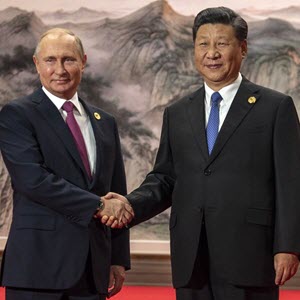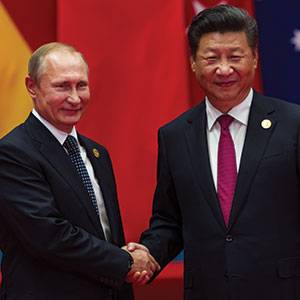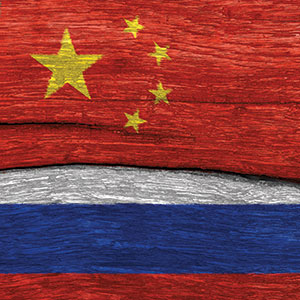Contact
Strategic Implications of China-Russia Relations
With converging interests in their immediate neighborhood, and shared dissatisfaction with real or perceived Western constraints on their geopolitical aspirations, the relationship between Beijing and Moscow has reassumed prominence in recent years. Today China is Russia’s top trading partner, and both Beijing and Moscow are involved in regional institutions and groupings, such as the Asian Infrastructure Investment Bank, the Shanghai Cooperation Organisation, and BRICS, that exist in parallel to, but are not integrated with, U.S.-led institutions. At the same time, historical complexities and power asymmetries in Sino-Russian relations have prompted questions about the depth and long-term vitality of the states’ bilateral, and even multilateral, cooperation.
Recognizing the momentum, complexity, and global significance of these developments, in October 2016, NBR launched a bipartisan 24-month project to inform U.S. policymakers, intellectuals, and, in turn, the broader public on the strategically significant cooperation, both current and possible, between Russia and China. With generous support from the Carnegie Corporation of New York, this project convenes scholars and practitioners to assess Sino-Russian political, economic, and military relations and what they mean for U.S. decision-making and international security. The effort will culminate in a number of publications, including a multi-author edited volume, and a series of briefings for policymakers.
Project Objectives
- Illuminate the current internal and external drivers of Sino-Russian strategic cooperation.
- Assess these variables in light of the historical and potential future development of Sino-Russian relations, giving special attention to asymmetries in the bilateral relationship and to each country’s relations with other major powers in the international system.
- Determine the strategic implications of Russian and Chinese behavior as they pertain to U.S. interests, the interests of key players in Asia—especially the Republic of Korea and Japan—Northeast Asian security, and the international system.
- Generate a coherent and integrated U.S. strategy to meet the crucial challenges, and opportunities, in today’s evolving East and West.
Principal Investigator
Robert Sutter, Professor of Practice of International Affairs, The George Washington University
Senior and Special Advisors
Richard Ellings, President, The National Bureau of Asian Research
Aaron L. Friedberg, Professor of Politics and International Affairs, Princeton University
Admiral Jonathan Greenert (ret.), John M. Shalikashvili Chair in National Security Studies, The National Bureau of Asian Research
Ambassador J. Stapleton Roy, Director, Asia Program, Woodrow Wilson International Center for Scholars
James Steinberg, Professor of Social Science, International Affairs, and Law, Syracuse University
Angela Stent, Professor of Government and Foreign Service, Georgetown University
Project Lead
Brian Franchell, Project Manager, Political and Security Affairs, The National Bureau of Asian Research





 Implications of China-Russia Cooperation for the United States and Japan
Implications of China-Russia Cooperation for the United States and Japan
 Axis of Authoritarians: Implications of China-Russia Cooperation
Axis of Authoritarians: Implications of China-Russia Cooperation



